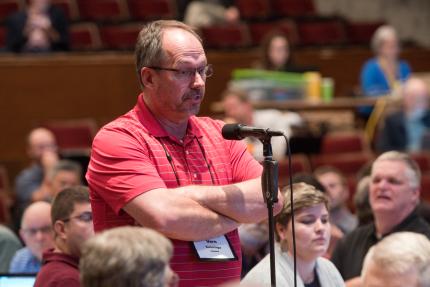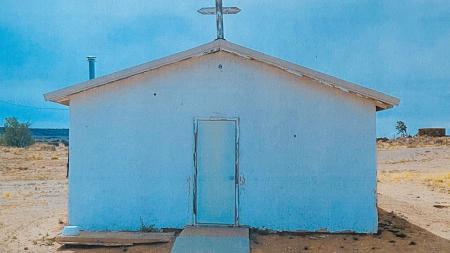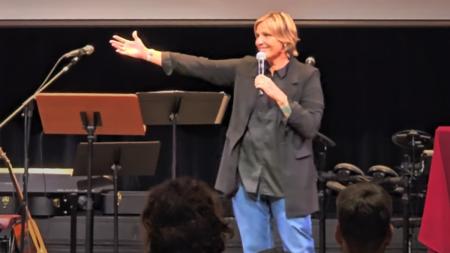Reimagining Ministry Shares

Vern Swierenga told delegates that ministry shares are about being in covenant together.
Karen Huttenga
“Since I became a minister I’ve been a very strong supporter of ministry shares, not because I necessarily agreed with the process but I agreed with the idea of the covenant relationship that I had with my fellow churches,” said Vern Swierenga from Classis Zeeland.
Ministry shares are a program of the Christian Reformed Church in North America that make it possible for all members in all churches to pool their funds and support a variety of ministries that they have requested over the years.
“This is our opportunity to do something much bigger than what we could do all by ourselves,” said Swierenga about participating in the ministry share system. He explained that “the idea of being in a covenant relationship with other churches, making an impact in the world was a wonderful thing for us to be able to do.”
It is a system that has been around since 1862, and was indeed built on the idea of churches covenanting together. But it was also a system in need of some adjustment. Participation in the program has been dwindling over the past few years and Synod 2016 asked that the whole system be “reimagined.”
Synod 2019 was presented with a proposal to do just that, and ultimately decided to adopt that proposal.
Under the old system, the denominational administration came up with ministry budget based on the various activities that previous synods had asked them to do. They recommended, and synod approved, a ministry share amount that was sent to churches based on the number of active members in each congregation.
Under the new system, each congregation will decide how much it can contribute to the denomination. These pledges will be gathered at the classical level (regional groups of churches), and then sent on to the denomination. The central administration will create a denominational budget based on the amount of pledges. This budget will be approved by the Council of Delegates annually, as is currently done. Compared to the old system, it is bottom-up.
Many of the delegates were pleased by this proposal, feeling it will bring denominational ministries closer to the congregations. Jonathan Owens said that it will make planning easier.
Swierenga said the process would “foster a much deeper covenantal relationship with one another” and would “draw us together as a denomination.”
But there was nervousness about it as well. Tom Wolthuis, Classis Central Plains, said that the plan was very similar to one they had adopted in their classis. Overall, the plan worked but his campus ministry took a 15% reduction in the money they were receiving from the classis churches.
Executive director, Steven Timmermans, said that if the denomination saw an overall reduction in ministry share pledges, the Council of Delegates and senior staff would have to put together a proposal for cutting programs.
Synod 2019 agreed to this “reimagined” system. They set the changes in motion, including a plan to communicate about ministry shares in a robust way over the coming year. Final approval for the new system awaits the approval of Synod 2020.
For continuous coverage of Synod 2019 including the live webcast, news, video recordings, photos, liveblog, social media links, and more visit www.crcna.org/synod.


